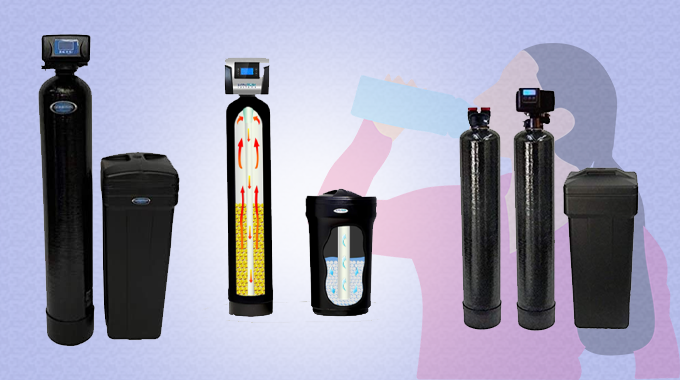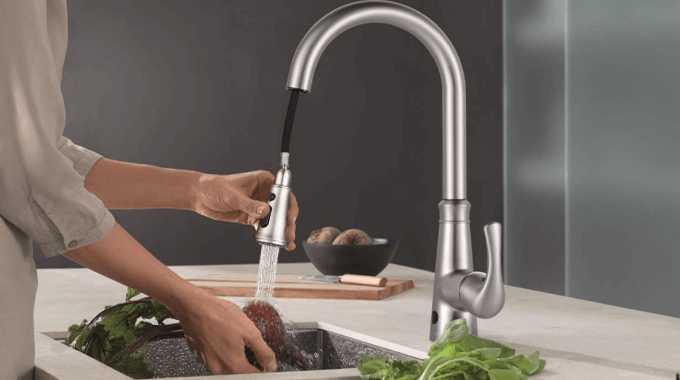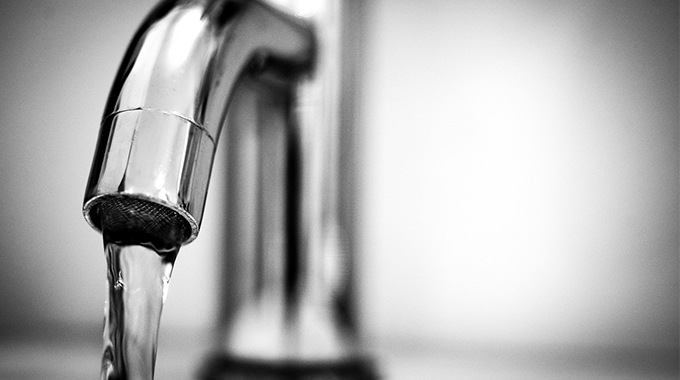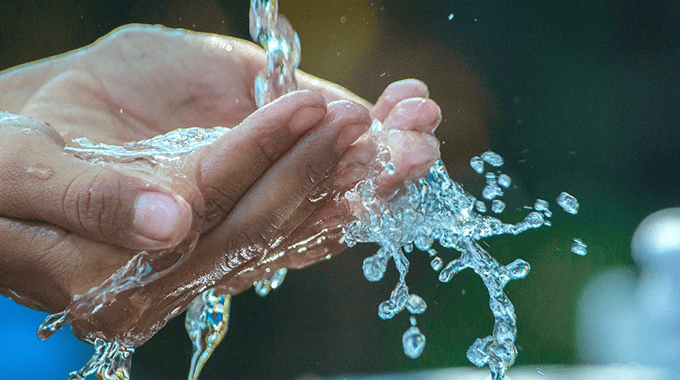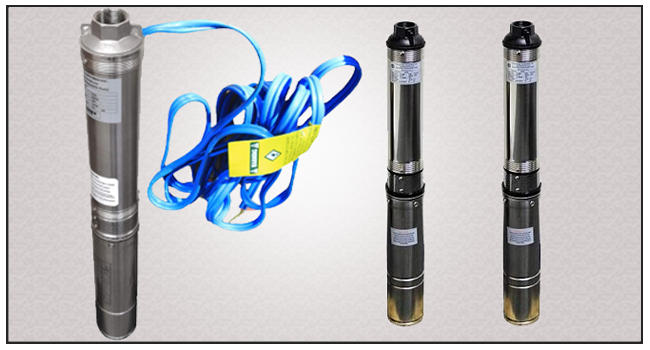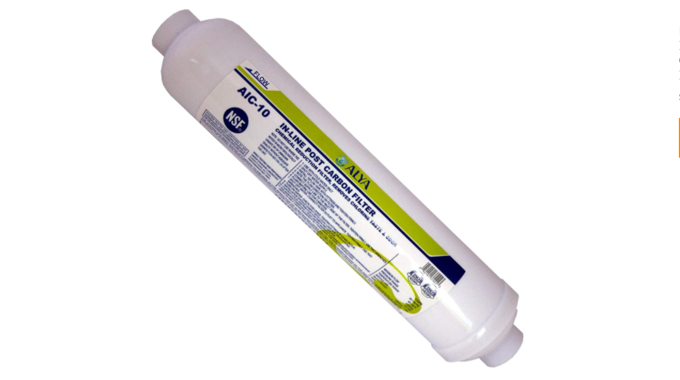Best Up Flow Water Softeners in Australia (Complete Review & Buyers Guide)!
Are you surfing the internet trying to find the best up-flow water softener in Australia for yourself ? then read on. You have landed on the right page. In this review, we will list the 3 best up-flow water softeners in Australia for you to choose from. We will also explore the difference between up flow and downflow water softeners and much more.
Do you find a white layer of substance on your water appliances and utensils? Are you noticing that your hair and skin is getting dryer after a shower? Do your clothes seem more worn out than they should? If the answer to all these questions is a yes, then you may have a hard water supply running through your house.
Hard water contains an excess of minerals like magnesium and calcium. While these minerals, when present in the water in a moderate amount, are healthy for us, an excess of them can be highly dangerous. The water becomes hard when it contains too much of these minerals and contains other metals like iron, zinc, etc.
Not only is hard water harmful to us when we drink it or use it for cooking food, but it also dramatically damages the building’s pipelines and water appliances. It causes a build-up of limescale and metals in the pipes and plumbing system.
To avoid these issues, water softeners were invented. There are many different types of water softeners available in the market, and an up-flow water softener is one of them.
We know that there are so many options to choose from on the internet, which can be confusing and overwhelming. To help you choose the best up-flow water softener for yourself, we have made this comprehensive list. After reviewing multiple up-flow water softeners in Australia, we have found these 3 to be the best.
Best Up-flow Water Softeners in Australia – Top 3 Picks
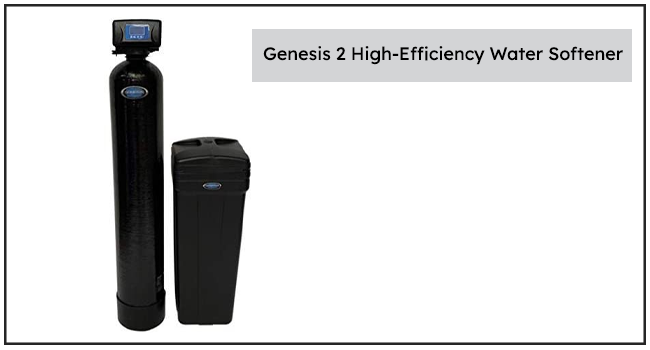
This Genesis water softener is undoubtedly one of the best water softeners we have come across. It is known as the ‘revolution’ for a reason. And it makes it to the top of our list for a few solid reasons. It can deliver a whopping 20 gallons in just one minute, making it one of the most efficient and reliable up flow water softeners in the market today.
One of the main reasons we think this is truly the best of the best out there is because of its feature to track the quantity of water remaining in the softener and how much is already used. Other softeners available in the market regenerate when you schedule them to. And others regenerate when they reach the filtering capacity. But Genesis takes it to another level by smarter regeneration.
Once the softener reaches its 3 percent mark of its filter capacity, it goes through a small regenerative cycle. This system partly begins to clean itself out and avoids an extended downtime (regeneration time). It will keep regenerating this way until the full scheduled regeneration time arrives. It then goes into complete regeneration, except it takes lesser time to regenerate than other softeners due to its unique features.
To top it off, the softener is one the best up-flow water softener because it helps you save approximately 45 percent salt. It does this by calculation the exact amount of salt brine it requires for the regeneration process. Not only does it work as an exceptional water softener, but it also helps you save a ton of money.
Furthermore, it comes with a built-in 7-day programmed flush cycle that removes stagnant water and tackles any possible bacterial growth problems. Not only does this feature increase the convenience points for this softener, but it also gives you an added protective layer that significantly improves the quality of water.
Features
- A high flow rate of 20 GMP
- Tracks water usage
- Regenerates smarter – small regeneration cycle at 3 percent capacity
- Reduces salt usage by 45 percent
- Ideal for a family of 4
- 10% crosslink resin
- Built-in 7-day programmed flush cycle
- Easy to install
- Buy here
ABCWaters Best Up Flow Water Softener
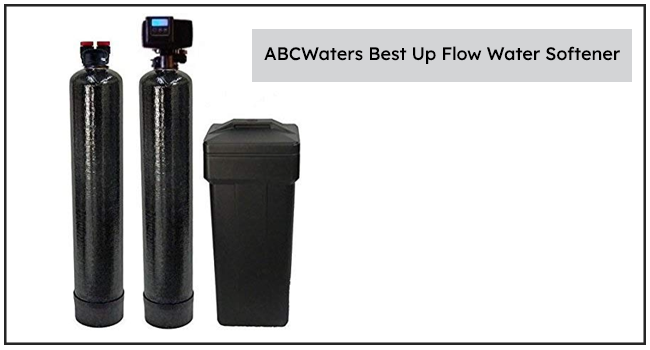
One of the main reasons this up-flow water softener made it to our list is because of the brand that it comes from. ABCWaters is a well know and trusted brand when it comes to offering high-quality and cost-effective water softeners. They have been making high-quality softeners for many years and is a customer favorite in the market.
This up-flow water softener by ABCWaters is perfect for a family of 2 to 5 people. This system not only softeners your water but also come with a premium quality carbon water filter. The softener and filter in this system will ensure that your hard water problems will soon be history.
With a stable 12 GPM flow rate, this is one of the most efficient up-flow water softeners in Australia in the market. And its dual carbon filtration system can treat water that has moderate to extremely high levels of hardness. Not only does it remove hard minerals and metals from the water, but it also removes chlorine, pesticides, iron, and organic impurities from the water.
It a premium-quality 1.5 cubic feet of active carbon media made from coconut shells, so you can expect high-quality of extremely pure water running through your faucets.
Features
- A flow rate of 12 GMP
- Ideal for a family of 2-5 people
- A dual carbon filtration system
- Removes pesticides, chlorine, etc.
- Active carbon media of 1.5 cubic feet
- 5600sxt valve meter
- Does not electricity
- 100% energy-efficient water softener
- Easy to install
- Buy here
SoftPro Elite Plus High-Efficiency Water Softener
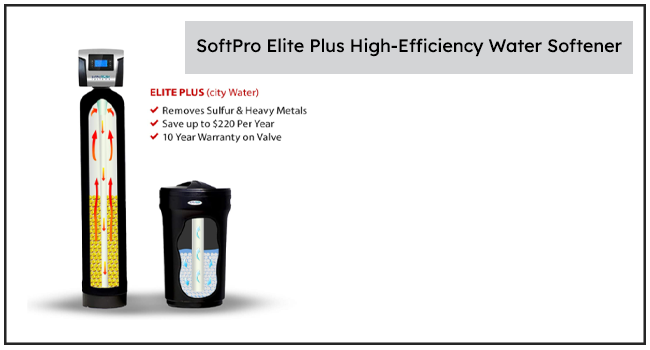
This SoftPro water softener is a new generate softener that comes with up-flow technology. As the name is self-explanatory, it indeed comes with elite features that guarantee 100 soft water and a smooth operating experience. If you, like us, love the durability, efficiency, and convenience more than anything else in a softener, then this one will not disappoint you.
While in other downflow softeners, you might need to use 3 to 5 bags of salt every month, this up-flow water softener uses 3 to 5 water softeners every year. This is a drastic decrease in salt use, which helps you save a ton of money. This often works on a reverse flow regen scheme, which protects the resin during the regeneration cycle.
If you are looking for a whole house up-flow softening system, give this one serious consideration as it comes with some unique features.
Features
- It uses 80 percent less salt than traditional softeners
- Reverse flow regen scheme
- It comes with a primary control valve
- Easy to understand – 4-line touchpad LCD
- Whole filtration system
- Media-guard KDF 55 filter
- 10% crosslink resin
- 32,000-grain capacity
- Easy to install
- Buy here
Complete Buying Guide Best Up Flow Water Softener in Australia- All You Need To Know!
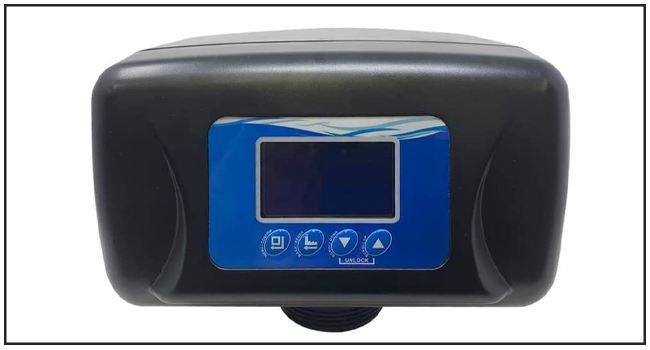
Up-flow Water Softener – What is it? Best Up Flow Water Softener Review
As we advance technologically, new types of softeners are being introduced in the market. There are a few different types of water softeners in the market. Up-flow water softeners are the latest addition to the list of different kinds of water softeners. And it is also become the most popular type of water softener due to the various advantages it offers over other types of softeners.
As the name suggests, an up-flow water softener directs the flow upwards. It works in a way that the hard water is injected into the bottom of the tank. The resin settles at the bottom of the tank and then allows the hard water to flow forward. It does this through the media layer and then what you get as a result of this process is soft water that is free from harmful metals and hard minerals.
Unlike in downflow water softener, a tunneling effect does not take place in up-flow water softeners. This is because up-flow water softeners undergo an anti-gravity motion, which prevents your tank’s resin from compression. One of the main reasons best up-flow water softeners in Australia are more popular is that they are more cost-effective than other water softeners.
They do not use and waste as much salt, and water as other types of water softeners do. And to add to that, up-flow water softeners also do not need any backwashing to function optimally. Many manufacturers are now producing and focusing on up-flow water softeners for their immense benefits and due to their advanced technological offerings.
Indeed, flow water softeners are more expensive than other types of water softeners. But in the long run, investing in a high-quality up-flow water softener will save you thousands of dollars in the long run. If you have hard water running through your pipes and are searching for the most efficient way to convert it to soft water, then an up-flow water softener would be the most cost-effective water softener for you.
In fact, an up-flow water softener has proven to offer the highest efficiency in the market. If you own a downflow water softener, and spend thousands of dollars on salts and resins, and want to avoid the hassle in the future, consider installing an up-flow water softener.
Not only will you save thousands of liters of water and thousands of dollars in the long run, but your pipes will also stay in optimum conditions for many years to come. An up-flow water softener is the perfect type of water softener for practical and smart homeowners. It is also ideal for business owners who want a better quality of water using the most cost-effective water softening system.
How Does An Up-Flow Water Softener Work? Water Softener Features
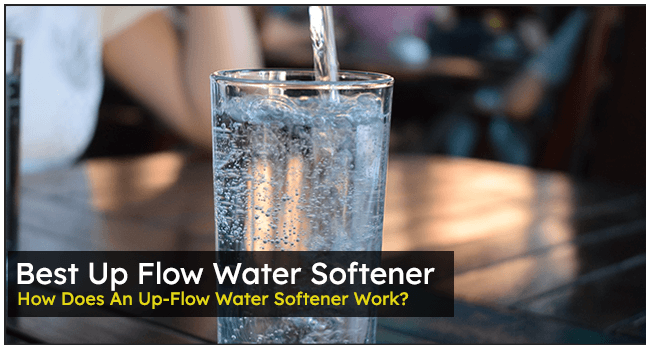
If you already have an up-flow water softener or want to buy a new one, knowing how these machines work their magic might be useful. One of the most important things to understand about up-flow softeners is how they recharge the resin. While downflow softeners recharge the entire resin, up-flow softeners recharge the resin more accurately.
Up-flow water softeners recharge only the depleted resin and not the entire resin tank. These softeners push the hardness ions stuck in the resin into the drain directly. The way up-flow softeners recharge and regenerate is much more cost-effective and efficient. Downflow softeners work the opposite way in which the dirty water ( generated during regeneration) moves through the entire resin.
This dirty water is created during the regeneration process while removing hardness ions from the resin. In the downflow system, the dirty water moves through the resin that has just been cleaned from hardness ions, which decreases the efficiency and effectiveness of the system. And as we said above, this does not happen in up-flow systems. Up-flow systems drain out the hard water directly without it moving through the recently regenerated (clean) resin.
Up-flow systems swirl the water. Because these units swirl the water, they remove channeling and extend the resin’s life and efficiency. That said, the softening process that occurs in up-flow systems is the same process that occurs in other water softening systems. This process is known as the ion exchange process.
In this process, the hardness ions in the hard water are exchanged for the salt ions present in the resins. This exchange replaces the hard minerals with salt minerals and creates soft water. The resin beads contain the salts, which exchange places with the hardness ions. Hardness ions are the hard minerals and metals in the water responsible for making the water ‘hard.’
When the salts take the place of the hardness ions, the hardness ions get stuck in the resin. And because they are stuck in the resin, there arises a need to regenerate the resin for the next cycle of water softening. If the resin is not clean, it will be full of hardness ions, unable to soften any more water.
Which One Is Better: Up-Flow Or Downflow Water Softener?
When buying a new softener, one of the main factors you need to consider is the type of water softener. Right now, the two types of water softeners that are the most popular in the market are the up-flow and downflow water softeners. Both have their advantages and disadvantages. And knowing which each type of water softener has to offer might help you make the right choice.
An up-flow water softener directs the flow of the water upwards. As it directs the flow upwards, the water, in a spinning motion, goes through the tank’s bottom. It goes up the tank and through the resin. On the other hand, the water in downflow systems travels more.
In the downflow system, the water flow goes through the entrance of the tank. Once it flows through the entrance of the tank, the water flows through an upper holding basket and then flows down. It flows around the distributor’s cylinder and then enters into the resin. Once the water reaches the resin, it then flows into the tube bottom basket of the resin. Then water then travels up through the same tube and exits the tank.
With an up flow softener, no such thing happens. You will not face problems with channeling like with down-flow systems. This will further save you thousands of liters of water and thousands of pounds as you won’t need as much salt. Downflow systems use five times more water and salt than up flow systems.
For example, if a downflow system uses 900 pounds of salts every year and around 71 pounds per month to function optimally. On the other side, an up flow system will only 350 pounds per year and approximately 38 pounds of salt every month. At this rate, the up flow system will save around 8200 pounds of salt in a 15 year time period, which translates to a lot of money saved.
Furthermore, in a downflow system, you need to set a specific date and time for regeneration. This means that the system will regenerate on that date and time, even if there is still soft water available. This will lead to wastage of soft water because the regeneration will occur irrespectively.
Downflow water softeners also have the backwashing function to raise their media filters, which is not the case with up flow water softeners. That said, both systems soften the water effectively. However, up flow systems save a lot of water and salt, thus a lot of money in the long run, and prove to be the most cost-effective and efficient type of softeners in the market today.
Buying Guide on Best Up flow Water Softeners- Best Water Softner 2023
If you’ve reached this part of our review, you have most likely decided to buy a new softener. However, deciding to buy a new up flow water softener and buying the best one that suits your needs and preferences are two completely different things. If you have a wider budget, then a pro logic high-efficiency water softener or a Genesis would be a suitable choice.
No matter which up flow softener you buy, considering these important factors while buying can help you make the right choice:
Capacity and Size
One of the most important factors to consider while buying an up flow softener is the capacity and size of your household. To find the most suitable softener, consider how much water does your household consumer daily and the size of your household. Here the size of your household would include the number of people living there.
Consider the level of hardness of the water, the number of bathrooms in the house, and the service flow rate. The hardness level of the water is an essential factor. If the water is extremely hard, you will need a more potent water softener to remove excessive hardness from the water.
If you have four members in the household, then the water softener should have a minimum capacity of 50000 grains. If you need help to determine the right size, you can calculate that on specific online calculators. Once you have the right size, you will have clear details about the budget for salt, water, and maintenance.
Ease of use
Another vital factor to consider while buying an up flow water softener is its ease of use. It’s always ideal to buy a softener that is easy to use and comes with features that help you understand what’s happening in the softener. Some softeners come with an LCD digital touchpad screen. The screen displays important information like how much water is remaining in the softener and how much water is currently under process.
Choose a softener that gives information that is easy to understand and one that eliminated all the confusing codes and jargon. While most water softeners are easy to install, ensure that you find out all the instructions on how to install them and consider your own skills as well for a smoother installation experience.
Effectiveness and Functionality
Ensure that the softener is able to deliver and solve the main problem for which you bought it in the first place. You’re purchasing the softener because your water contains unwanted and unsafe levels of minerals and metals. And you’re buying a softener because you can see a white layer on your water appliances along with frequent pipe damages.
So, while buying a softener, ensure that the softener you choose will remove these unwanted substances from the water and make it safe and good for you. No matter which model or brand you choose, ensure that the softener will eliminate the excess of minerals and metals from the water and give you soft water.
Another important feature to consider is the crosslink resin percentage, which reflects the efficiency and effectiveness of the water softener. To add to that, it’s always helpful to consider the water softening systems your friends, family members, and other contacts are using. You will most likely get the most honest reviews from them who have already used these type of softeners.
And remember, it takes a lot of information, patience, and time before you can figure out which softener will be the best one for your needs and preferences.
Conclusion
There are many different types of water softeners available in the market. An up flow water softener is the most efficient and effective type of water softener you will find.
This is because it drastically reduces your expenses and also saves a lot of water. Water is a resource we all need to use more respectfully. Not only do up flow systems use eight times less salt than downflow systems, but they also save a lot of water in the process.
We hope the three best up flow water softeners list we have provided you with has given you enough quality options to choose from. And we also hope our elaborative buying guide has given you enough information on up flow systems to help you make the right choice.

